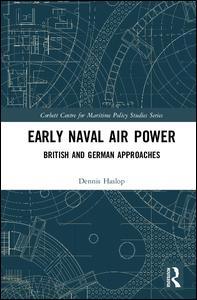Early Naval Air Power British and German Approaches Corbett Centre for Maritime Policy Studies Series
Auteur : Haslop Dennis

This book examines the British and German approach to naval air power, describing the creation and development of the two naval air service organizations and doctrine.
This work provides new insights as to how two naval air services were influenced by internal and political interventions, and how each was integrated into the organizational structures of the Royal Navy and the Kaiserlichemarine (KM). Both the Admiralty and the KM made substantial alterations to their organizations and doctrine in the process. Principal air doctrines employed are examined chronologically and the application of operational doctrine is described. While they adopted similar air doctrines, there were differences in operational doctrine, which they addressed according to their different requirements. This book is a comparative study about the development of organization and air power doctrine in the RNAS (Royal Naval Air Service) and the IGNAS (Imperial German Naval Air Service). It investigates public and political interventions and early concepts of air power, placing into context the factors which contributed to how naval theorists came to think about the best means of controlling its working medium, air space. Ultimately, it examines the similarities, and differences, between the RNAS and IGNAS understanding of naval air power, within the broader strategic and theoretical framework of their parent organizations.
This book will be of great interest to students of air power, naval power, military history, strategic studies and IR in general.
Introduction 1: The dawn of the era of flight and the formation of the RFC/RNAS, from its inception until the end of 1915. 2: The dawn of the era of flight and the formation of the imperial German Naval Air Service, from its inception until the end of 1915. 3: RNAS development and the challenges from within and without, leading to the formation of the RAF, 1916-1918. 4: IGNAS development and the challenges from within, 1916-1918. 5: Conclusion.
Dennis Haslop holds a PhD in Defence Studies from King's College, London and a PhD in Maritime History from the University of Exeter. He is also the author of Britain, Germany and the Battle of the Atlantic (2013).
Date de parution : 01-2018
15.6x23.4 cm
Thème d’Early Naval Air Power :
Mots-clés :
Naval Air Service; RNAS; naval air power; Seaplane Carriers; Royal Naval Air Service; World War I; Air Committee; Imperial German Naval Air Service; Inter-service Rivalry; Royal Flying Corps; Unrestricted U-boat Campaign; Kaiserlichemarine (KM); Flight Commander; Royal Navy; Imperial German Navy; Naval Aviation; Independent Air Service; Naval Air; Naval Staff; NW; Air Board; Cfs; Minesweeping Flotillas; Air Force Contingents; German Bight; Air Department; Sea Lord; RFC; GF; JWAC; RNAS Aircraft



